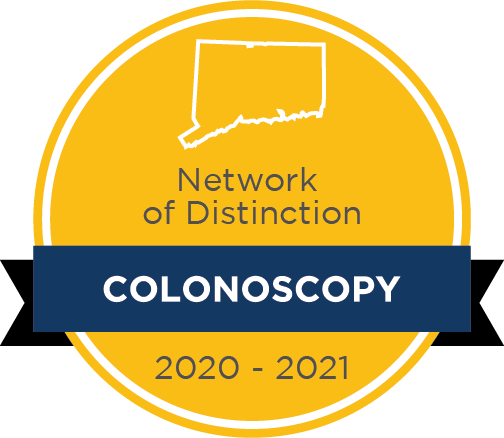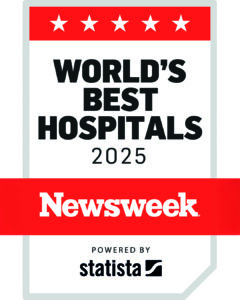Uncomfortable aside, digestive disorders of all kind can interfere with your daily activities and generate necessary stress. They can also, if left untreated, become detrimental to your health.
At the Digestive Disorders Center at Griffin Hospital, we treat a wide range of digestive problems from gas, heartburn and bowel discomfort to the more severe diseases of the gastrointestinal (GI) tract, including colon cancer.
We offer a wide range of advanced diagnostic tools and treatment options. All procedures are performed in our state-of-the-art GI suite by our highly skilled and experienced staff of gastroenterologists, general and colorectal surgeons, and specially trained nurses who provide exceptional care according to our Planetree patient-centered philosophy.
Our expert staff uses endoscopic instruments with high definition images to provide the latest in diagnostic and therapeutic procedures, including Perioperative Anesthesia.
- Conditions We Treat
- Planetree Amenities at the Digestive Orders Center
- Signs and Symptoms of Digestive Disorders
- Your Safety and Satisfaction
- Patient Care Navigation
Schedule an Appointment
To schedule your appointment please call Griffin Hospital Central Scheduling at (203) 732-7423.
Conditions We Treat
We specialize in treating many conditions, including:
- Gastrointestinal Bleeding (Anemia/Hidden blood in stool)
- Polyps
- Colon Cancer Screening/Prevention
- Esophageal, Pancreatic, Stomach, Liver, Colon and Rectal Cancer
- Gastroesophageal Reflux Disease (GERD)
- Inflammatory Bowel Disease (Ulcerative Colitis and Crohn’s Disease)
- Peptic Ulcer Disease
- Diverticulosis/Diverticulitis
- Irritable Bowel Syndrome
- Swallowing Disorders
- Hiatal Hernia
- Hemorrhoids
- Gallbladder, Bile Duct and Pancreas Diseases
- Cirrhosis of the Liver/Viral Hepatitis
- Lactose Intolerance
- Celiac Disease
- Barrett’s Esophagus
Planetree Amenities at the Digestive Orders Center
To aid in relaxation and healing.
As part of Griffin Health Services Corporation, The Digestive Disorders Center follows the principles of the Planetree patient-centered model of care. To aid in healing and relaxation, The Center offers the following Planetree amenities:
- Pager program for families
- Encourage patient participation to review charts
- Aroma Therapy
- Reiki, Therapeutic Touch and Soft Touch Massage
- Massage Therapy
- Rice socks
- Magazine Rack
- Available coupons for non-prescription medications
- Healing Garden
- Health Resource Center
- Patient Education Packets
- Religious Services
Signs and Symptoms of Digestive Disorders
Digestive disorders can be complex and show subtle symptoms. They may be inherited or develop from factors, including stress, fatigue, diet and smoking or alcohol abuse.
The following symptoms may be warning signs of a digestive disorder:
- Abdominal/chest pain
- Chronic cough
- Difficulty swallowing
- Diarrhea
- Gas (belching and flatulence)
- Unexplained weight loss or poor appetite
- Heartburn or indigestion
- Chronic constipation
- Jaundice (yellowing of the skin and whites of the eyes)
- Rectal bleeding
- Nausea and vomiting

Get Rewarded for Choosing High-Quality Care
Connecticut State Employees and State Health Plan members can now earn a cash reward for choosing this high-quality service for their healthcare needs through the State of Connecticut Network of Distinction program. To get started book an appointment through your State Health Navigator at (866) 611-8005 or at carecompass.ct.gov/nod.
Your Safety and Satisfaction are Our Main Focus
Quality care in a patient-centered environment.
The Digestive Disorders Center at Griffin is committed to ensuring a safe environment for our patients, visitors, and staff. As part of our hospital-wide culture of safety, our goal is to provide patient-centered, safe, equitable, timely, effective, and efficient care. We encourage our patients (and their family members) to ask questions about their treatment and to be actively involved in their care and safety.
Exceptional Nurses
In 2008, the Digestive Disorders Center nurses were named “New England’s Best Nursing Team” by ADVANCE for Nurses, the biweekly magazine of the nursing profession. The staff is very involved in promoting colon cancer screenings and cancer prevention through community outreach, which was a factor in the staff also being recognized as Griffin Hospital’s Department of the Year in 2007.
Tops in Patient Satisfaction
The Digestive Disorders Center has consistently ranked very high in patient satisfaction. In the past three years, roughly 97% of The Center’s patients said they were very satisfied with their treatment.

Treatment Specialties
Colonoscopy
A colonoscopy is conducted to view the inside of the colon and can detect polyps (pre-cancerous growths), tumors, ulcers, inflamed tissue and bleeding. Colonoscopy is commonly used as a screening tool to prevent and treat colon cancer. During a colonoscopy, a long, flexible tube called a colonoscope is inserted into the rectum. A tiny video camera at the tip of. Find out more here.
Endoscopic Retrograde Cholangiopancreatography (ERCP)
ERCP is a procedure that helps your doctor diagnose problems in the liver, gallbladder, pancreas and bile ducts, including gallstones, inflammatory strictures (scars), leaks (from trauma and surgery), jaundice (yellow coloring of the skin), continuous undiagnosed abdominal pain, and cancer. ERCP combines the use of X-rays and an endoscope, which is a long, thin tube equipped with a light and. Find out more here.
Bravo (Esophageal pH Monitoring)
An esophageal pH test measures and records the pH levels in your esophagus to determine if you have gastroesophageal reflux disease (GERD) – the cause of heartburn. This test allows your doctor to evaluate your heartburn symptoms to determine the frequency and duration of acid coming up into your esophagus. The test can also be done to determine the effectiveness. Find out more here.
Percutaneous Endoscopic Gastrostomy (PEG)
Percutaneous endoscopic gastrostomy (PEG) is a surgical procedure that places a tube for feeding without having to perform an open operation on the abdomen (laparotomy). It is used in patients who will be unable to take in food by mouth for a prolonged period of time. A gastrostomy, or surgical opening into the stomach, is made through the skin. A. Find out more here.
Upper GI Endoscopy
Upper GI Endoscopy is a visual examination of the upper digestive tract using an endoscope, a long, thin tube equipped with a light and a video camera. The upper gastrointestinal tract begins at the mouth, continues through the esophagus and stomach, and ends at the upper part of the small bowel called the duodenum. Some of the purposes of this. Find out more here.
Weight Loss & Management
Manage Your Weight with Help from Griffin Hospital Being overweight can be a debilitating chronic condition if it’s not managed correctly or consistently. Griffin Hospital offers several programs aimed at helping those with weight issues and several more focused on prevention and wellness. From a few extra pounds to obesity, extra weight is a cause of concern. Obesity Prevention &. Find out more here.
Digestive Disorders
Symptoms of Digestive Disorders Signs and Symptoms of Digestive Disorders Digestive disorders can be complex and show subtle symptoms. They may be inherited or develop from factors, including stress, fatigue, diet and smoking or alcohol abuse. The following symptoms may be warning signs of a digestive disorder: Abdominal/chest pain Chronic cough Difficulty swallowing Diarrhea Gas (belching and flatulence) Unexplained weight loss or. Find out more here.





